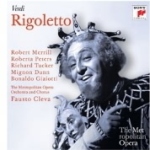If you had happened into the old Met on the afternoon of February 22, 1964, you would have heard and seen this Rigoletto and you would have left happy. It’s a perfectly good performance, very indicative of its time. There’s a big cut in the first-act Rigoletto/Gilda duet, the Duke’s “Possente amor” is cut, interpolated high notes abound from the soprano, and everyone is singing at full throttle. Fausto Cleva’s conducting is entirely lacking inspiration, insights, or subtlety, with the oom-pah-pah aspects of the score plain and clear (the two men’s choruses) and the choruses somewhat ragged–but the action moves along, generates excitement, and it pleases the audience. On repeated listening, however, it’s a bit crude and “by rote”.
Robert Merrill’s voice is a gorgeous instrument and his Rigoletto is handsomely sung, although his awful, life-long habit of delivering key words in a type of barking Sprechstimme for dramatic effect is both unmusical and a cheap way out of expressing deep emotion. He recorded the role twice commercially: the earlier set, with Björling and Peters (1956), finds him in even more beautiful voice, and the later, with Moffo and Kraus (1963) is more probing (Solti is the hard-driving conductor). Here he is always creditable, delivering a “Cortigiani” of power and sadness. He flats on the (interpolated) top A-flat at the end of the “Vendetta” duet, but otherwise the top is free, if occasionally growly. For intellect in this role, he really wasn’t the guy to turn to.
Richard Tucker is in fine voice for the Duke, delivering a nuance-free interpretation but with a voice of gold–albeit at one volume level: loud. His “La donna e mobile” is capped with a flawless run leading to a big B-natural, but prior to that–say, in “Parmi veder le lagrime”–you get the feeling of being yelled at.
If you are a fan of Roberta Peters’ type of voice–i.e., a canary fancier–then you will love her Gilda (I prefer a fuller-bodied sound). She’s in good form, though not as fresh as in 1956, and she vocally acts the role, unlike her colleagues: she will move you in the final duet. The E-natural interpolated at the close of an otherwise lovely “Caro nome” is glassy and unnecessary, but the normally irritating high D-flat she adds to the close of the Quartet is so beautifully sung–pianissimo–that it’s musically lovely and apt. Bonaldo Giaiotti is a dark, doom-laden Sparafucile, and Mignon Dunn adds luxury–and fine vocal acting–to Maddalena. John Macurdy’s powerful, angry Monterone is just one of the other nice points.
I can’t see this being anyone’s first choice for a Rigoletto recording; if you love Merrill, he’s better in different ways on both recordings mentioned above. And with competition like Gobbi, Callas, and di Stefano on EMI and Sutherland, Pavarotti, and Milnes on Decca, this really isn’t a necessity.
































